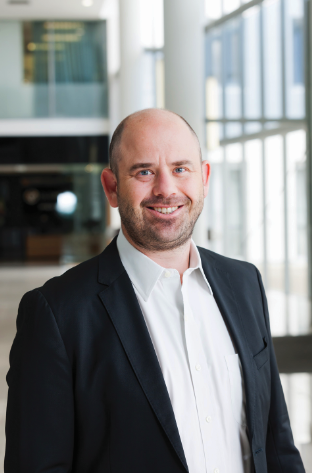SPONSORED CONTENT
Water scarcity, social security and inequality are most urgent current risks facing corporate SA’s bottom line

Old Mutual Investment Group (OMIG) has identified water scarcity, social security, inequality, and failure to navigate a just transition to be among the biggest risks threatening the country’s sustainability today, and well into the future. In identifying these risks, the Cape Town-based investment manager says it plans to get its investee companies to not only acknowledge these risks but take corrective action against them.
“There is a growing realisation among investment managers and their clients that responsible investing goes beyond simply acknowledging risks, to taking decisive action to address these risks,” says Rob Lewenson, OMIG’s Head of Responsible Investment. In an emerging market like South Africa, decision makers must therefore consider the many environmental and social issues that present short-term challenges to a firm’s sustainability in addition to responding to the longer-term climate change narrative.
“The responsible investing debate goes beyond the return that an investor gets from backing South Africa Inc, or the profit this cohort delivers to its shareholders, to addressing inequality, infrastructure, unemployment and, of course, delivering a just energy transition,” says Lewenson. He adds that many of the challenges the Government is struggling to address at present are interrelated. For example, the climate change crisis is inextricably bound to the lack of clean energy provision, inadequate infrastructure, social upheaval and the country’s water security, to name a few.
Water security
Water impacts every component of an economy and society. Statistics show that roughly 74% of natural disasters between 2001 and 2018 were water-related, and as far back as 2015, the United Nations Office for Disaster Risk Reduction estimated that economic losses from weather-related disasters amounted to between US$50 billion and US$300 billion annually. “While climate change is likely to increase these losses over time, increasing water demand coupled with rapid urbanisation means that water risks will be substantive even in the absence of climate change,” Lewenson says.
Many South Africans are concerned that a looming water crisis will dwarf the economic and social consequences suffered due to the current electricity supply disruptions. It is also possible that water scarcity will heighten existing social pressures, raising the risk of a repeat of the social unrest that afflicted the country in July 2021. There are also concerns that local firms that found ways to work around Eskom’s loadshedding schedules may not be able to respond to the emerging water crisis with similar aplomb.
“Developing and maintaining our water infrastructure and protecting our scarce water resources is an imperative given our broad-based dependency on the resource,” Lewenson says, before warning that water scarcity will have a significant impact on firms in agriculture, healthcare, manufacturing, mining and many other sectors. Listed companies are well-positioned to respond to the myriad environmental and social challenges facing the country, but they sometimes need a nudge to take action.
“Our active stewardship process begins with an acknowledgement of an issue, followed by the investee firm’s commitment to doing what it can to address the issue, with a clear plan that will be managed at the board level which is reported to stakeholders in a transparent and quantifiable manner” says Lewenson.
In the context of a looming water crisis, the investment manager is encouraging its investee firms to make formal statements recognising the environmental and socioeconomic impact of their water usage. The ‘commitment’ stage is achieved by asking firms to implement a strategy for responsible water usage, including making investments to improve efficiencies in both utilisation and waste. Investee firms must set out their water usage commitments in a Water Usage Plan and ensure that actions are taken in line with this plan and regularly reported on.
Achieving a just transition
Every firm operating in South Africa, whether listed or not, has the responsibility to assess its operational exposures to a just energy transition and water supply constraints. But energy and water should not detract from other factors that contribute to social unrest, including social security.
In this regard, South Africa stands out as the most unequal country in the world, with a Gini coefficient of 63. Inequality has been shown to negatively impact economic growth, and research shows that pay inequality amongst the employed disproportionately impacts household levels of inequality when compared to the impact of unemployment. “The answer is not only to increase employment, but to ensure that those who are employed, are paid a decent wage,” notes Lewenson.
Investment managers face many challenges in their active stewardship roles. “Some investee firms are quick to acknowledge an issue or risk but getting them to commit to taking decisive action to address that issue is not as simple,” Lewenson says, acknowledging the impact on these firms due the tough macroeconomic environment.
However, local companies cannot afford to wait for the next crisis to flatten them. Instead, they should actively position for the risks that are on their five- to 10-year horizons. “Firms know that they are going to face big climate events; they know that water scarcity will become an issue; and they know that ongoing inequality and poverty increases the risk of social unrest,” Lewenson says.
Investee firms must start reporting on their environmental and social successes, which includes telling shareholders about progress towards gender pay parity, adoption of renewable energy, recycling wastewater, and reskilling workers, among others. And it goes without saying that these reports should accurately reflect the status quo, the path to addressing concerns, and the actual corrective actions taken.
Lewenson points out that “doing your part for the environment (or society) is not as simple as ticking annual ‘boxes’ on a 25- to 50-year decarbonisation (or other) measure”. It is just as important for firms to make consistent and incremental improvements on their journey to becoming responsible corporate citizens.
As for investment managers, their role remains to guide investee firms in identifying areas that need correcting and assisting firms to take remedial actions. In doing its part, OMIG will focus on no fewer than 30 of its top investee firms to ensure that critical risks are addressed, thereby maximising the socioeconomic dividend from its stewardship activities.
“We have to focus on fulfilling our stewardship role because that is the only way that allocators of capital can influence business outcomes,” concludes Lewenson. “We invest, nowadays, to achieve impact-led return while acknowledging and addressing the myriad risks that our stakeholders face”. DM
Rob Lewenson – Head of Responsible Investment
















